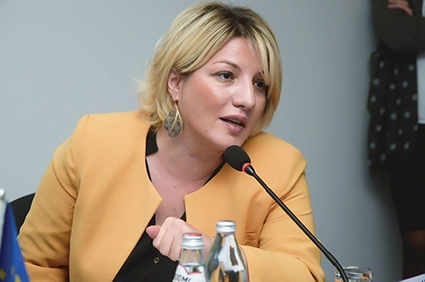Challenges in Environmental Technologies Development and Climate Change
Established in 2005, GEO is a voluntary partnership of governments and organizations that envision “a future wherein decisions and actions for the benefit of humankind are informed by coordinated, comprehensive and sustained Earth observation and information.” GEO Member Governments include 96 nations, the European Commission, and 87 Participating Organizations comprised of international bodies with a mandate in Earth observation.
The Twelfth Plenary Session of the Group on Earth Observations (GEO-XII) and Ministerial Summit was held in Mexico City, Mexico, on 11-13th of November, 2015. Approximately 410 delegates attended the Plenary and Ministerial Summit, representing 87 entities, including 41 countries and 37 participating organizations.
Georgia Today spoke to Head of the National Environmental Agency, Tamar Bagratia, who was invited to participate.
GEO-XII was truly a large-scale event attracting the attention of global media and seeing many of the world’s organizations and institutions presenting their achievements. Unfortunately, Georgia can’t boast of technological advancement for now but the experience sharing and best practice applications serve as a basis for the development in this regard. How did Georgia fit in?
I think this is an important platform to look for partners, to gain information about new achievements and to fully integrate into the existing systems. However, in reality, Georgia is far from up-to-date technology integration and we found quite a big gap in this sphere. This is due to the fact that, for a long time, the field of technology was not considered a priority. But we intend to work hard in this direction and we are aware that if we choose the right course, we have a chance to approximate to international standards.
The principal outcomes of these meetings included the adoption of the Mexico City Declaration and approval of the GEO Strategic Plan for 2016-2025. The importance of using Earth observation and related information to help the world achieve the Sustainable Development Goals (SDGs) will be a focus for GEO activities in the coming decade. The delegates once again confirm that full and open access to Earth observation data, information and knowledge is crucial for humanity as it faces unprecedented social, economic and environmental challenges.
Tell us about the recent conference that was held in Tbilisi regarding early warning systems
I would like to highlight that recently, as a response to the current top issues on the global agenda, an international conference on environmental monitoring technologies and early warning systems was held in Tbilisi, initiated by the National Environmental Agency with the assistance of the United Nations Development Program (UNDP). Swiss, French, Finnish and other international experts spoke about early warning systems and shared their best practice on natural hazard monitoring processes and early warning systems as set up in their counties.
In this context, I must refer to the fact that one of the main work directions of the Mexico Ministerial was Public Health Surveillance that foresees the raising of public awareness and supporting policy-making and management through accurate monitoring and early warning at local, national, regional and global levels.
You mentioned in an interview that the current national [Georgian] meteorological observance system is incomplete and does not comply with modern standards
I should say, that the current reality leaves a lot to be desired. The out of date methodologies of the soviet times are still being applied in meteorological observation activities on a daily basis in Georgia. There is wide range of other problems in this sphere: the NEA has no meteorological radars (at least 2 meteorological radars are needed), there is lack of information for modelling, and we are not sufficiently integrated into database sharing systems. What’s more, there is shortage of human recourses in regards to modern technology usage. In this matter, our major objective is to transfer timely from the post-soviet system and approach modern international standards on a national scale. As they say, a dollar invested into meteorology gains 20 dollars profit.
While talking about the environmental concerns one must mention the main problem on the global agenda- the climate change issue
The twenty-first session of the Conference of the Parties (COP) and the eleventh session of the Conference of the Parties serving as the meeting of the Parties to the Kyoto Protocol (CMP) will take place from 30 November to 11 December 2015, in Paris, France.
It is evident that the climate change problem won’t be avoided by Georgia and the South Caucasian region. Global warming has already started to have a significant impact on nature and people in Georgia– effects that will become even more severe in the future. With regard to climate change, Georgia already shows climate induced changes with increasing temperatures, shrinking glaciers, sea level rise, reduction and redistribution of river flows, decreasing snowfall and an upward shift of the snowline. More extreme weather events have also characterized the last ten years with flooding, landslides, forest fires and coastal erosion, with significant economic losses and human casualties as a result.
In countries such as Georgia, the risks of climate change for the agricultural sector are a particularly immediate and important problem because the majority of the rural population depends either directly or indirectly on agriculture for their livelihoods. Currently, the NEA is working intensively in collaboration with the Ministry of Agriculture and, especially for this sector, climate change studies for all regions were elaborated. The NEA plans to address the climate change issues in Agrometeorology and develop this field, providing farmers with agriculturally relevant weather forecasts, as well as to develop strategic plans to assist climate change mitigation process.
Despite the fact that the current national environmental observation network is scarce and inadequate, the NEA, with maximum aptitude, is carrying out its daily environmental monitoring activities and processes, acquiring data for final delivery to the affected parties.
And, finally, we are strongly committed to the fact that the Agency must continue to grow and develop in order to respond to the current and future requirements.












